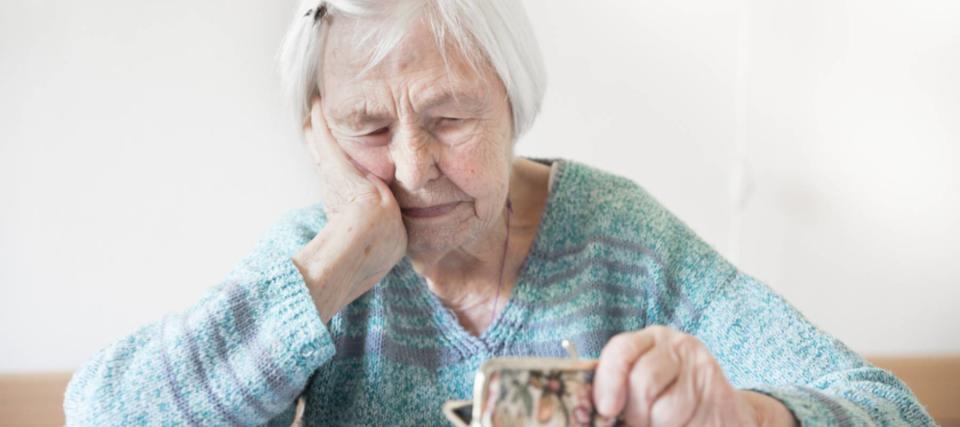Older Americans are stashing thousands around the house. Here's why this practice can lead to lost wealth

Adrienne Volpe almost threw out her grandmother’s collection of books after she passed away — a decision that could have lost her a small fortune.
“My grandmother had pressed thousands of dollars in single bills inside books,” Volpe told the New York Times (NYT), recounting how she thought she would find autumn leaves within the pages instead.
Don't miss
Commercial real estate has beaten the stock market for 25 years — but only the super rich could buy in. Here's how even ordinary investors can become the landlord of Walmart, Whole Foods or Kroger
Cost-of-living in America is still out of control — use these 3 'real assets' to protect your wealth today, no matter what the US Fed does or says
These 5 magic money moves will boost you up America's net worth ladder in 2024 — and you can complete each step within minutes. Here's how
Volpe’s grandmother had stashed about $10,000 in bills as small as $20 within her books.
Children and grandchildren of older Americans report finding hidden cash and valuables in their loved ones’ homes after they die — like under the mattress or even inside a freezer — due to mistrust in financial institutions.
But this practice can lead to potential wealth-building losses and complications for your loved ones after you pass.
Why you risk losing money by storing it in the sofa
While you might have concerns about fraudsters accessing your bank account and siphoning funds from your savings — there are plenty of risks in leaving bundles of cash at home as well.
Experts note that your valuables could get stolen, destroyed by a disaster, like a fire, or even pocketed or misused by a family member. Plus, you could lose out on potential wealth-building opportunities by not investing this money and benefiting from compound interest growth.
“The lost interest — it probably would have been double, just by having it in the bank all these years versus having it in the bottom of a closet,” said Patrick Simasko, an estate lawyer in Mount Clemens, Michigan, who once uncovered nearly half a million dollars in cash and gold in the home of an older client who had hired him to execute her estate.
Some professionals say they often see this cash hoarding behavior among baby boomers and the silent generation — particularly those who grew up during the Great Depression and the bank failures of the 1930s.
However, Mark Criner III, senior trust strategist for Baird Trust in Scottsdale, Arizona, noted that some folks from certain minority communities are prone to this practice as well.
“That’s borne of minorities’ lack of access to these institutions for decades, and even when there was access, there was a lot of abuse,” Crimer told the NYT. “They weren’t always treated fairly or dealt with honestly.”
Read more: Rich young Americans have lost confidence in the stock market — and are betting on these assets instead. Get in now for strong long-term tailwinds
Problems for your loved ones after you pass
Volpe isn’t the only one who’s nearly lost an inheritance to the trash bin due to a dead relative’s secrecy — Susan Camp told the NYT she and her brother unknowingly tossed $5,000 in cash their deceased father had packaged in aluminum foil and stored in the freezer (they later retrieved it).
She also found another $6,000 in a box for cologne.
Experts say hiding your valuables at home and failing to keep records of ownership or through a detailed will can create problems for your loved ones after you’re gone. Your heirs might never find your stashed funds — or there can be conflict over who is entitled to what.
“It’s just messy, it’s unofficial and it can lead to accounting nightmares,” Criner said.
It’s important to make financial plans for the long term — including for what happens after you’re gone. Try to ease the inheritance process for your loved ones who will likely be grappling with their grief as well by writing up (and regularly updating) a clear and comprehensive will.
In some cases, folks facing cognitive decline, like with Alzheimer’s or dementia, may start experiencing paranoia and exhibiting cash hoarding tendencies. Experts recommend appointing a financial power of attorney who can take over financial decisions making when you’re not able as well.
What to read next
Car insurance premiums in America are through the roof — and only getting worse. But 5 minutes could have you paying as little as $29/month
‘You’ll end up with $1.5 million in the bank’: Kevin O’Leary says you should do this 1 thing with your money in order to 'succeed into retirement’
The 5 most expensive mistakes in options trading and how to avoid them
This article provides information only and should not be construed as advice. It is provided without warranty of any kind.

 Yahoo Finance
Yahoo Finance 